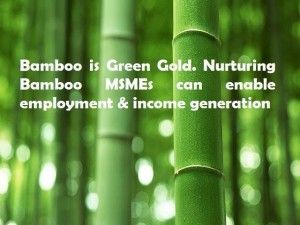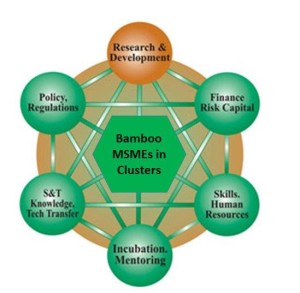 From a ‘poor man’s timber’ to green gold’, bamboo is fast emerging as the super material of the 21st century. It is one of the fastest growing and highest yielding renewable natural resource making it a good substitute to wood in mitigating pressure on natural forests. Bamboo is a family of grass; it matures in as little as 3 to 5 years much faster than hardwood trees. It sends out new shoots after each harvest. Bamboo has unrivalled capacity to capture carbon.
From a ‘poor man’s timber’ to green gold’, bamboo is fast emerging as the super material of the 21st century. It is one of the fastest growing and highest yielding renewable natural resource making it a good substitute to wood in mitigating pressure on natural forests. Bamboo is a family of grass; it matures in as little as 3 to 5 years much faster than hardwood trees. It sends out new shoots after each harvest. Bamboo has unrivalled capacity to capture carbon.
The fact that bamboo is a super material and has immense economic potential does need any reinforcement anymore. From bamboo flooring, bamboo home & outdoor furniture, bamboo weaving products and handicrafts to bamboo charcoal personal care & healthcare products and bamboo apparel affordable and super premium eco homes to bamboo bicycles, bamboo beer, bamboo shoots, bamboo tea and luxury bamboo items like sunglasses, shoes, bags and more to the recently launched black burger with Bamboo Charcoal Cheese by Burger King Japan – bamboo has found usage in almost every walk to life.
#PromoteBamboo as an Affordable Building Material@PMOIndia @NITIAayog @ChouhanShivraj @amitabhk87 https://t.co/nnKXLM6fj2 pic.twitter.com/zoLmmTdyS6
— GreenGoldBamboo.com (@GreenGoldBamboo) June 26, 2017
China has been extremely successful in leveraging bamboo – the sector provides employment to over 35 million people and generates annual revenues in excess of US$ 10 billion. Apart from China, other Asian countries like Taiwan, Thailand, Indonesia, Philippines, Malaysia, Japan and Vietnam are making tremendous growth and progress in bamboo business.
The strength of the vascular bundles make bamboo an ideal material for a bicycle frame! #Bamboo pic.twitter.com/HZb88nAxVb
— Biotic Bikes (@bioticbikes) March 26, 2017
India has the largest area and the second largest reserve of bamboo in the world. This super material indeed has tremendous potential to transform the country’s rural economy and contribute to sustainable development efforts, especially north east India, which has the country’s maximum bamboo resources.
Yet, not much progress has happened and India lags much behind in terms of bamboo development. A number of policy and regulatory issues coupled with lack of entrepreneurship & skill development has led to this stagnation.
A systematic, integrated and actionable approach to developing the bamboo sector will not only contribute to the emergence of new businesses, job creation, poverty alleviation, and the empowerment of women and minorities but also help reduce India’s carbon footprint.
While it is encouraging to see the current government take measures to drive the future of bamboo, it has to play the lead role for the transformation and creating the appropriate ecosystem for the development of India’s Bamboo Sector.
The Ministry of Micro, Small and Medium Enterprises (MSME), Government of India has been adopting cluster development approach as a key strategy for enhancing the productivity and competitiveness as well as capacity building of Micro and Small Enterprises (MSEs) in the country.
To enable Bamboo realise its true potential as ‘Green Gold’ governments would do well to adopt Micro and Small Enterprises Cluster Development approach in powering the future of the Bamboo sector. It will enable achieving the economies of scale in terms of deployment of resources as well as focusing on the specific needs of Bamboo MSMEs and Bamboo Start-ups.
A cluster development road map needs to be developed keeping in mind emerging opportunities while also addressing imperatives like innovation in new bamboo product development, technology innovation for building competitiveness and innovation in positioning Bamboo as Fashionable, Trendy and eco-friendly; while leveraging the power of digital media in building an enabling bamboo ecosystem.
Also Read: Innovation – Key mantra, say bamboo industry pioneers at Green Gold Bamboo Summit
In many states especially those in the North east region of India, farmers grow bamboo on marginal and degraded lands as well. There are hundreds of MSMEs that produces incense sticks and bamboo handicraft products. However, going forward if the true potential of Bamboo has to be unleashed as the super Material of the 21st century; entrepreneurs will need to be innovative regarding their products. At the Green Gold Bamboo Summit held on April 28, 2017; Bamboo industry pioneers, experts and Bamboo evangelists univocally opined that ‘Innovation is the Key Mantra’.
We also need to keep at the top of our mind that building a digitally enabled Bamboo ecosystem is something that we just cannot afford to ignore in today’s world. It will help integrate the various government departments and connect them with target beneficiaries. It can ensure that the government schemes are made available to aspiring Bamboo start-ups, artisans and bamboo MSMEs quickly and in a transparent way.
Social media and the growing internet base catapulted by the increasing penetration of smart mobile phones has changed the way people across geographies are receiving information. A digitally empowered Bamboo ecosystem can enable dissemination of knowledge and information related to latest bamboo harvesting & cultivation practices, new product innovation, technology solutions and above all enable taking the bamboo products to the door steps of discerning consumers to create the necessary demand for bamboo products. We have to leverage the power of Digital media in inspiring & incubating bamboo MSMEs.



